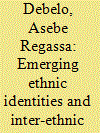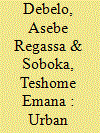| Srl | Item |
| 1 |
ID:
118354


|
|
|
|
|
| Publication |
2012.
|
| Summary/Abstract |
The politics of ethnicity was formally institutionalised in Ethiopia in 1991 with the introduction of ethnic federalism. This study deals with emerging ethnic identities and the dynamics of the inter-ethnic relationship between the Guji and Burji peoples in south Ethiopia. The article argues that, following the enunciation of ethnicity as a leading political order in 1991, identities have been articulated in such a way that past historical incidents and memories have been reactivated and old labels have been redefined by ethnic entrepreneurs for various motives. This promotes (re)construction of ethnic identities and inter-group polarisation. In the Guji-Burji case, it is this fragile relationship that is easily changed into inter-ethnic conflict as a result of competing interests over resources. The article concludes that while the cause of the current Guji-Burji conflict is primarily economic in nature, it took on an ethnic dimension within the context of politicised ethnic identities that hardened group boundaries. Synchronising past relationships - both conflicting and harmonious - with the contemporary scenario, the article tries to shed some light on the dynamics of the Guji-Burji relationship, focusing particularly on the post-1991 political order in Ethiopia and its local implications.
|
|
|
|
|
|
|
|
|
|
|
|
|
|
|
|
| 2 |
ID:
193196


|
|
|
|
|
| Summary/Abstract |
Frontier making in Ethiopia has historical roots from the formation of the modern Ethiopian state in the late-19th century through wars of conquest. The conquest, which was inspired by political and economic motivations of the highland Christian kingdom, used the notion of a “civilizing mission”—civilizing the “backward” and “underdeveloped” people, and “underutilized” spaces—through imposition of an imperial state system and Orthodox Christianity. The foundation and horizontal expansion of Addis Ababa or Finfinne by displacing Indigenous inhabitants was part of the state building project under successive regimes. Over the last century and a half, the city has continued its unchecked expansion in a process involving multilayered actors whose interests overlapped in terms of grabbing the land they considered “underutilized.” More specifically, the last three decades evince commoditization of farmlands, grazing areas, and cultural and sacred spaces through land lease, which eventually dissolve existing customary systems, values, and practices. This paper critically analyzes the dynamics of frontier making in or from Addis Ababa or Finfinne, the political economy behind such unchecked frontier expansion and how it activated the power of resistance in 2014. The paper concludes that frontier making in or from Addis Ababa through dispossession of Oromo farmers has been part of the broader political establishment in Ethiopia and should be viewed within the same lens.
|
|
|
|
|
|
|
|
|
|
|
|
|
|
|
|